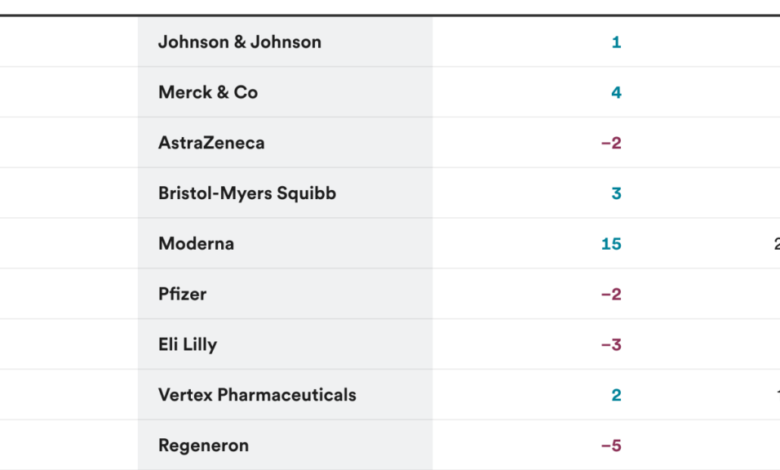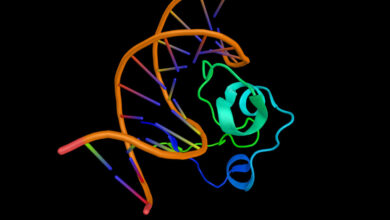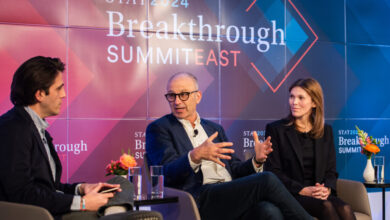Nvidia, Biogen, Ionis, AstraZeneca, ChatGPT

Want to stay on top of the science and politics driving biotech today? Sign up to get our biotech newsletter in your inbox.
Asking again! Could you tell us what you think of The Readout? Fill out this survey!
Today, some interesting tidbits from STAT’s Breakthrough Summit West in San Francisco, AstraZeneca’s antibody helped prevent Covid-19 in immunocompromised patients, and more.
Google, NVIDIA say AI already impacting drug discovery
Artificial intelligence is already making its mark in drug discovery, leaders from NVIDIA and Google said yesterday at STAT’s Breakthrough Summit West. We don’t yet have an AI-developed drug. But there have been more investigational new drug applications to the FDA that cite AI, STAT’s Katherine MacPhail and Mario Aguilar write. And some early-stage readouts aided by AI may be showing signs of success.
“We’ll, hopefully in, call it 10 years or 15 years time, get to that medicine n-of-1. If the process and the manufacturing of medicines can really, really be reduced, then we don’t have to worry about those economies of scale of drug manufacturing, we can actually build and manufacture those drugs,” an executive at NVIDIA said.
The most innovative and inventive drugmakers
Which drugmakers are the top R&D performers — and how do you parse innovation from invention? The 13th Pharmaceutical Innovation and Invention Index, which was released at the STAT Breakthrough Summit West, makes this distinction in a ranking of the largest pharmaceutical companies.
The companies flagged as particularly inventive are J&J, Merck, and AstraZeneca — because of their plush pipelines and novel experimental medicines. Meanwhile, Novo Nordisk, GlaxoSmithKline, and Pfizer have been deemed excellent at innovation in the past year, thanks to their ability to commercialize new medicines.
AstraZeneca antibody reduced Covid-19 risk in immunocompromised
From STAT’s Jason Mast: AstraZeneca said that a new long-acting antibody reduced immunocompromised patients’ risks of contracting symptomatic Covid-19 infections in a large Phase 3 prevention trial.
That could mean a new option for vulnerable individuals — such as certain cancer patients and transplant recipients — who have been awaiting drugs that can provide additional protection since Evusheld, AstraZeneca’s previous antibody, was yanked from the market in the face of new variants in early 2023. One new option was already authorized last month.
Still, it’s not clear whether the new antibody, sipavibart, will actually reach market. SARS-CoV-2 has evolved since the company began developing the drug and sipavibart is not thought to effectively neutralize variants with a mutation called FL456, which many circulating variants now carry.
The trial had two primary endpoints: Reduction in disease from any variant, and reduction in disease from variants without a FL456 mutation. AstraZeneca said sipavibart met both those endpoints. It has not yet said how sipavibart fares against variants with FL456 mutations. Regulators will likely be keen to know.
Live! From STAT Breakthrough Summit West
On this week’s “Readout LOUD,” we’re live in San Francisco at STAT’s Breakthrough Summit West. AI is a big theme this year, everywhere, so on that note, we chat with our AI correspondent — and recent Pulitzer finalist — Casey Ross, who sat down on stage to discuss AI-centered drug discovery with both NVIDIA and Google-backed Isomorphic Labs.
We also discuss this week’s biotech news, including yet more obesity drug data, this time from Roche, and the closing of Novartis’ acquisition of MorphoSys.
Listen here.
Biogen, Ionis genetic medicine fails in ALS trial
An attempt by Ionis and Biogen to treat non-genetic forms of ALS with an experimental gene-targeting medicine has failed. The companies tested a drug, BIIB105, in a 99-patient trial, but it failed to show improvement in patients — so they are discontinuing further studies.
Only about 10% to 20% of ALS cases are genetic, but some promising preclinical research suggested that silencing the ATXN2 gene might hep any patient who develops ALS, STAT’s Jason Mast writes. And while the drug did indeed lower ATXN2 levels in the spinal fluid, it didn’t seem to slow the death of patient neurons.
Ionis still has a treatment for FUS-driven ALS, a genetic form of the disease, in Phase 3 study. The NIH is funding efforts to make custom drugs for the extremely rare genetic drivers of ALS.



